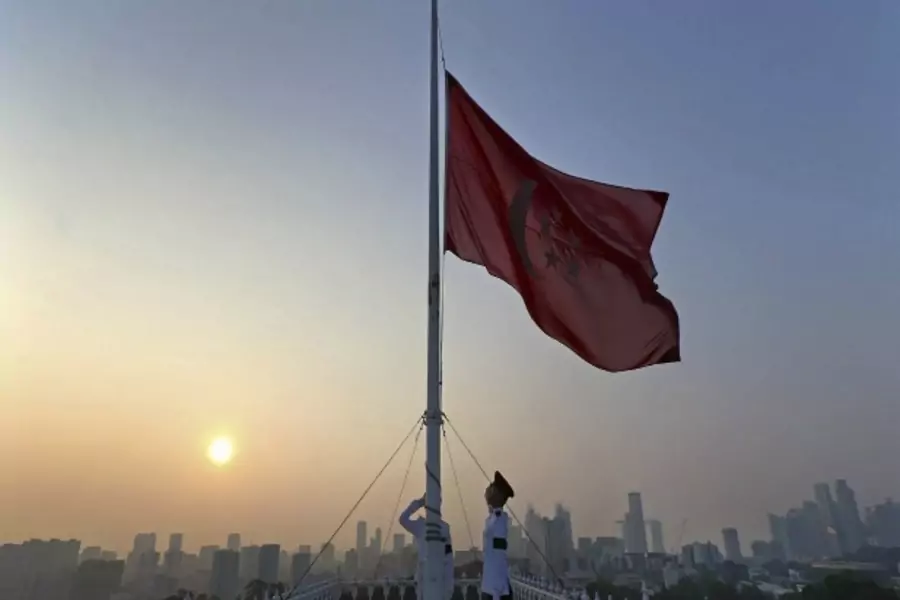More on:
Ashlyn Anderson, Lauren Dickey, Darcie Draudt, William Piekos, and Ariella Rotenberg look at the top stories in Asia today.
1. Lee Kuan Yew, founding father of Singapore, dies. Lee Kuan Yew, who transformed Singapore into one of Asia’s wealthiest and least corrupt countries during his time as founding father and first prime minister, died on Monday. Lee was prime minister beginning in 1959, after Singapore gained full self-government from the British, until 1990. While his leadership was often criticized for suppressing freedom, his advocacy of “Asian values” and development models succeeded in making Singapore an international hub of business, culture, and finance. The funeral for Lee, to be held on Sunday, will be attended by many current and former world leaders, including India’s Narendra Modi, Australia’s Tony Abbott, Indonesia’s Joko Widodo, and a U.S. delegation that includes Bill Clinton, Henry Kissinger, Thomas Donilon, and Kirk Wagar, the current U.S. ambassador to Singapore.
2. Indonesian president completes first bilateral foreign visits. This week, President Joko "Jokowi" Widodo traveled to Japan and China, marking his first bilateral foreign visits since taking office last October. He started his tour with a four-day official visit to Japan, a fellow democracy and maritime neighbor, where Jokowi and Japanese Prime Minister Shinzo Abe agreed to boost security and economic ties and launched an initiative to increase Japanese investment in Indonesia. Jokowi was also wooed by Japan’s bullet train system and is considering introducing a Japanese system in Indonesia. On Thursday, Jokowi traveled to China, where he signed a number of memorandums of understanding. Courting controversy after some media outlets reported that he said China had no legal claim to the South China Sea, Jokowi clarified that Indonesia would remain neutral in the dispute.
3. South Korea announces intention to join China’s proposed development bank. South Korea’s Ministry of Finance released a statement on Thursday it would seek to be a founding member of the China-led Asian Infrastructure Investment Bank (AIIB), through which Beijing hopes to fund infrastructure development throughout the region. While the United States has voiced concerns about the AIIB’s governance, South Korea’s statement makes reference to the importance of ensuring high levels of transparency and governing structure, tied into existing multilateral development banks. Seoul joins the UK, France, Germany, and Italy as U.S. allies that have announced their intention to be founding members of the AIIB. The move represents Seoul’s latest attempt to navigate increasing rivalry between China, its largest trading partner, and the United States, its security guarantor. Currently the U.S. ally is actively debating the U.S. military’s introduction of Theater High-Altitude Area Defense (THAAD) missile defense systems, which Washington promotes as a deterrent to the North Korean threat but Beijing claims is a thinly veiled U.S. attempt to constrict China.
4. Chinese police raid NGO offices. This week, Chinese police forces seized financial documents and computers from a high-profile nongovernmental organization (NGO). Members of the anti-discrimination group, Beijing Yirenping Center, said that twenty men in police uniforms burst into their offices before dawn on Tuesday morning. On Friday, Lu Jun, head of Yirenping, announced an ongoing investigation into the seizures, which he claims were illegal. Lu told reporters that the raid was likely in response to his organization’s campaign to pressure the Chinese government into releasing five detained women’s rights activists. Police administrators have not commented on or confirmed the raid. Since President Xi Jinping came to power, dozens of human rights activists have been apprehended as part of a broad crackdown on social activism and political dissent. The detention of the five activists on International Women’s Day captured the world’s attention, prompting calls from U.S. ambassador to the UN, Samantha Power, demanding their release.
5. Okinawa’s governor orders halt to base construction. Early this week, Takeshi Onaga, the governor of Okinawa, ordered the suspension of work on a new American military airfield at Camp Schwab. The relocation of U.S. forces to a base near the village of Henoko has been delayed for years by local opposition, who fear the environmental impact of construction and the long-term implications of a new base for Okinawa’s future. Onaga, who was elected governor last December in part because of his promise to halt construction of the base, instructed Japan’s defense ministry to stop work after local officials found builders had damaged coral reefs. Tokyo has said it will ignore the order and continue with the project; Onaga has threatened to revoke a maritime drilling permit should survey work and construction continue. About half of U.S. military personnel—which total nearly fifty thousand—are stationed on Okinawa.
Bonus: Burger King perfume soon to be on sale in Japan. For one day only, on April 1, Burger King will release a Whopper-scented perfume to the Japanese public. The fragrance, incidentally named “Flame-Grilled,” will not be the first Burger King scent to hit the market. Back in 2008, the fast food joint released “Flame by BK,” a body spray for men described as “the scent of seduction with a hint of flame-broiled meat.” This year’s scent will be available for the budget-friendly price of 5,000 yen, or roughly four U.S. dollars.
More on:
 Online Store
Online Store
